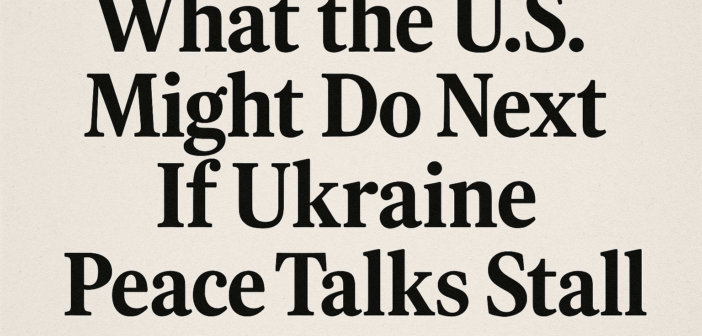The United States may soon abandon its efforts to mediate an end to the war in Ukraine if no significant progress is made in the coming days, U.S. Secretary of State Marco Rubio warned on Friday.
“If a resolution to the war isn’t viable, we need to prepare to move on,” Rubio stated during a press briefing in Paris, where he held a series of high-level meetings with European and Ukrainian officials. “We’re talking days, not weeks, to figure out if peace is even possible.”
Rubio’s remarks reflect growing impatience within the Trump administration over the lack of traction in ending the now three-year-old conflict. Despite diplomatic engagement, a breakthrough remains elusive, with Russia rejecting a ceasefire proposal that Ukraine had previously agreed to.
President Trump, who vowed on the campaign trail to resolve the war swiftly, has recently signaled frustration, declaring that “Russia has to get moving” on negotiations.
While Thursday’s talks between U.S., Ukrainian, and European representatives were described by the State Department as “constructive,” real progress remains uncertain. A partial ceasefire on critical energy infrastructure—brokered by Washington—expired the same day, with both Ukraine and Russia accusing each other of repeated violations.
U.S. Officials Express Conditional Optimism
Vice President JD Vance expressed a more hopeful tone shortly after Rubio’s warning, noting that the administration sees potential in ongoing diplomatic efforts.
Speaking from Rome during a bilateral meeting with Italian Prime Minister Giorgia Meloni, Vance hinted at behind-the-scenes progress. “There are developments we can’t yet disclose publicly, but we are optimistic that a resolution is within reach,” he said.
Vance’s comments suggest a nuanced internal strategy: publicly pushing for quick results while continuing quiet backchannel negotiations.
Devastating Strikes Underscore Urgency
The diplomatic efforts come amid renewed violence. A Russian ballistic missile attack on the city center of Sumy, Ukraine, on April 13 claimed 34 civilian lives—including two children—and injured at least 117 others. The attack, which used cluster munitions, struck the area during peak foot traffic, destroying residential buildings and critical infrastructure.
This latest assault, along with another missile strike that hit a residential neighborhood in Kharkiv overnight—killing one and injuring 67—underscores the urgent need for a diplomatic solution.
U.S. Peace Proposal Presented to Both Sides
According to a State Department briefing, a U.S.-crafted peace framework received “positive signals” during the Paris meetings. The same proposal was also presented to Russian Foreign Minister Sergey Lavrov, the department confirmed.
Rubio emphasized the purpose of his visit to France was to determine whether meaningful negotiations could even take place. “If we’re too far apart, if there’s no real path forward, then it’s time to acknowledge that and reassess our role,” he said.
“This isn’t America’s war—we didn’t start it. But we’ve supported Ukraine for three years, and we want to see this conflict end,” Rubio added. “President Trump has made over 80 days of direct effort to reach peace. Now, it’s time to determine if peace is even feasible.”
Breakthrough in U.S.-Ukraine Minerals Deal
Despite the challenges on the peace front, the U.S. and Ukraine have made strides toward solidifying a major minerals agreement. On Thursday night, both countries signed a memorandum of intent, paving the way for an Economic Partnership Agreement.
Ukrainian Economy Minister Yulia Svyrydenko confirmed the news in a statement on X (formerly Twitter), announcing the future establishment of an Investment Fund for Ukraine’s reconstruction.
“This memorandum marks a major step forward,” Svyrydenko said. “It follows extensive negotiations and technical discussions in Washington. We are now moving toward finalizing the agreement’s text, signing it, and securing parliamentary ratification.”
An earlier version of the deal failed to progress in February due to a dispute between President Trump and President Volodymyr Zelensky. Since then, U.S. Treasury officials and Ukrainian representatives have resumed talks in Washington to iron out the final details.
Svyrydenko expressed confidence that the deal will be mutually beneficial. “There is still work to do, but we are seeing substantial momentum and progress,” she said.



